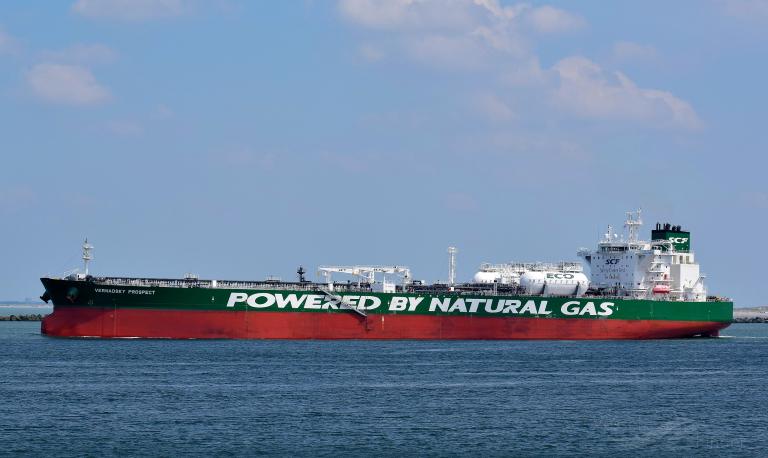On 4 June 2021, Sovcomflot (SCF Group) and Sakhalin Energy, the operator of the Sakhalin-2 project, signed long-term time-charter contracts for two existing LNG-fuelled tankers of SCF’s successful ‘Green Funnel’ series, Korolev Prospect and Vernadsky Prospect.

The agreements were signed at the 24th St. Petersburg International Economic Forum by Igor Tonkovidov, President and CEO of Sovcomflot, and Roman Dashkov, CEO of Sakhalin Energy, in the presence of Alexander Novak, Deputy Prime Minister of Russia, Pavel Sorokin, Russia’s Deputy Minister of Energy, and Alexey Miller, Chairman of the Management Committee of Gazprom.
The vessels will be delivered to the charterer in 2024 and employed to shuttle crude oil for the Sakhalin-2 project for ten years, with an extension option for up to three years. Prior to delivery, both tankers will be upgraded, including the installation of a bow loading system and a modification to their LNG bunkering systems to allow direct fuelling from the project’s Prigorodnoye production complex LNG terminal.
Following the delivery of these two vessels to the charterer, the shuttle tankers currently employed at the Sakhalin-2 will continue to provide shipping services to other Sovcomflot customers.
Alexander Novak, Deputy Prime Minister of Russia, said:
“The Russian government keeps a strong focus on environmental protection, continuously introduces measures to enable the reduction in atmospheric emissions, and lends its support to similar initiatives of the business community. Agreements signed today between Sakhalin Energy and Sovcomflot, which provide for using LNG-fuelled tankers in the Russia’s Far East, demonstrates a responsible approach towards sustainability. Adopting LNG as a fuel within transportation industry, including seaborne transportation of Russia’s export cargoes, is meant to play a significant part in increasing the environmental safety of our planet.”
Igor Tonkovidov, President and CEO of Sovcomflot, commented:
“We deeply appreciate the lasting partnership between Sovcomflot and Sakhalin Energy, which saw our vessels safely deliver 67.5 million tonnes of oil and 55 million cubic metres of LNG to Sakhalin Energy’s customers in the Asia-Pacific. The agreements signed today allow us to take our cooperation to the next level. Sovcomflot continuously works to expand and upgrade its fleet serving the Sakhalin-2 project, making it ever more efficient and safe. We are particularly pleased that Sakhalin Energy is eager to employ our ‘Green Funnel’ tankers, which will help reduce the carbon footprint of cargo shipping in the Far East. The new long-term time-charters will also contribute to reaching the goals set by our SCF-2025 strategy.”
Roman Dashkov, CEO of Sakhalin Energy, noted:
“The transition to LNG as the marine fuel for vessels employed at the Sakhalin-2 project reflects the global trend towards decarbonisation and is an integral part of our ‘Green LNG’ corporate strategy. This strategy will allow the company to further contribute to reducing its carbon footprint. Importantly, carbon neutrality cannot be achieved without the involvement of leading businesses. Our longstanding cooperation with Sovcomflot will help us progress further in this regard.”
LNG fuel is the cleanest fuel currently available for shipping operations both commercially and technically. Data collected by SCF shows that compared to conventional fuels, LNG reduces carbon dioxide (CO2) emissions by as much as 26 per cent and nitrogen oxides (NOx) emissions by 94 per cent, while eliminating both sulphur oxides (SOx) and particulate matter emissions completely. On top of that, using LNG also reduces fuel consumption by as much as 10-12 per cent, which increases the vessel’s energy efficiency.
Source: Sovcomflot